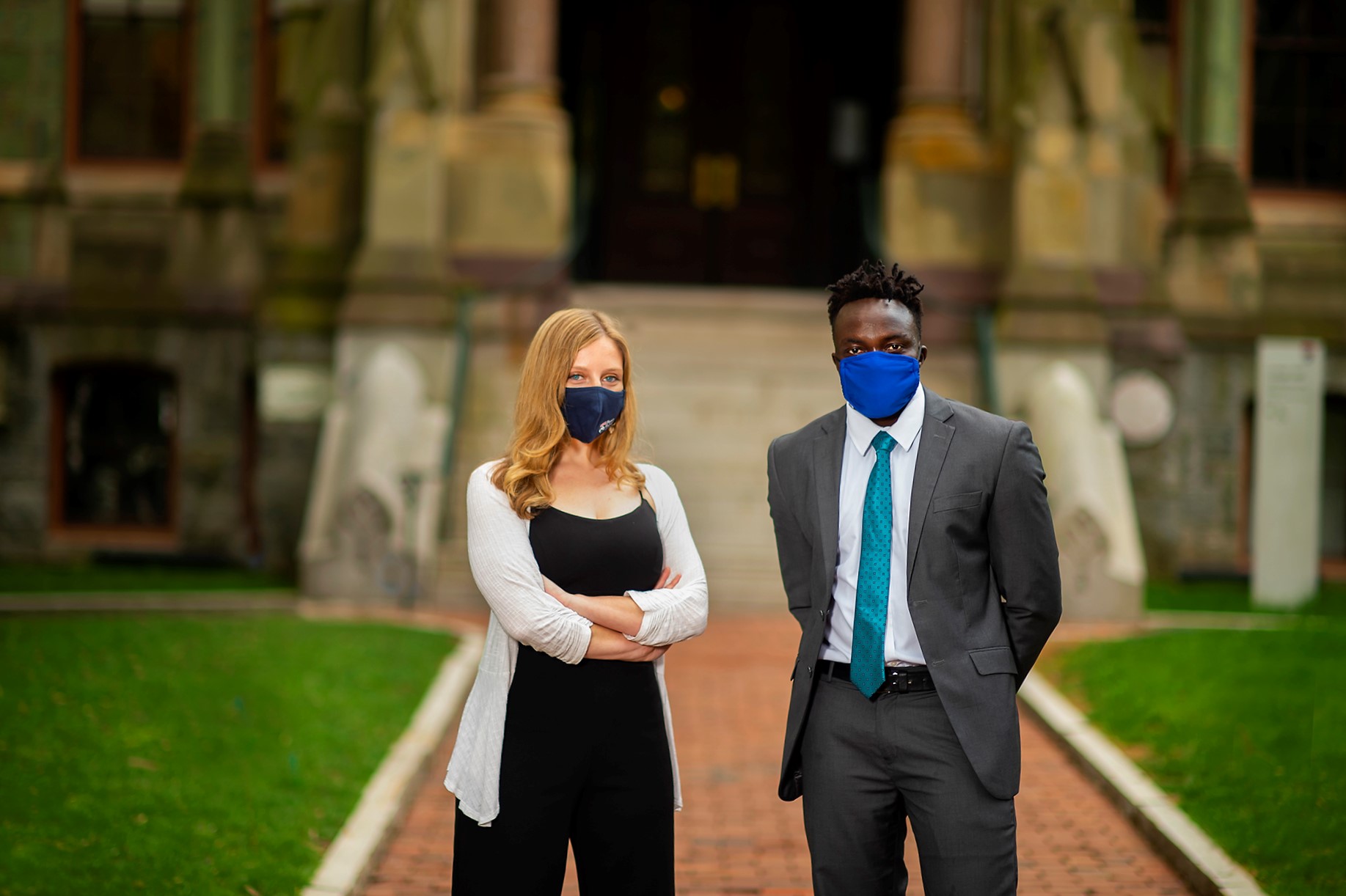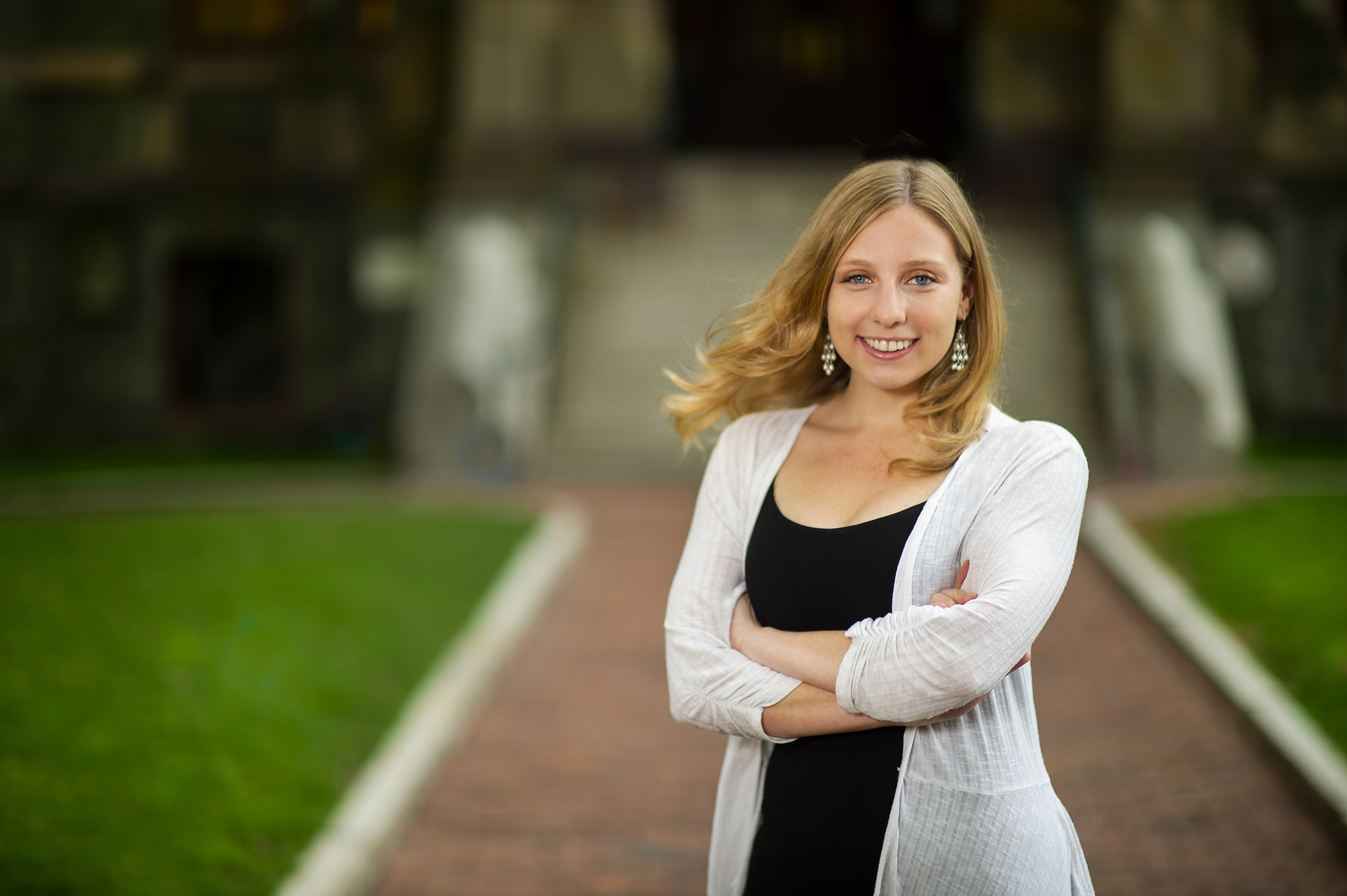
Seniors Martin Leet and Leah Voytovich first met through a mutual friend during their junior year and quickly hit it off. “We just started talking, and we realized that we have a lot in common,” says Leet. One thing they shared were backgrounds shaped by migration. Leet as a refugee from South Sudan, and Voytovich is the daughter of Jewish refugees from the Soviet Union. That brought them together and inspired them to apply for a President’s Engagement Prize (PEP).
As one of this year’s winning PEP teams, Leet, a College of Arts and Sciences design major from Bor, South Sudan, and Voytovich, a School of Engineering and Applied Science computer science major from Stamford, Connecticut, are now poised to empower refugees in Uganda to obtain one of life’s most fundamental needs: access to clean water. Through their project, Maji, which means “water” in Swahili, they will install a solar-powered water tank and provide agricultural and first aid training for members of the Olua I community.
Accessing clean water in Ugandan refugee camps is currently a time-consuming and unpredictable process. Maji’s goal is to provide members of the Olua I community with clean water using solar-powered water tanks. The project will provide enough water for both personal and agricultural use and will help empower refugees to grow food as well as providing more time for other essential activities such as attending school.
“Maji underscores a fundamental principle: that easily accessible clean water is a basic human right,” says Penn President Amy Gutmann. “Maji is unique both for its enthusiastic on-the-ground support in Uganda’s Olua I refugee camp, as well as for its exciting potential to become a scalable model across other regions of the world.”
Through Leet’s experience living in a refugee camp until 2016, he understands the barriers that refugees face and wanted to find innovative ways to support displaced communities in Uganda. “Water is really essential, and if you live in a refugee community they’re worried about where would they get water next,” says Leet. “It also takes time, and it is the opportunity cost that's the biggest issue here. It is that kid who will be late for school or the mom who had to wait four hours for water.”
“I’ve always been really passionate about working with and helping people trying to find a new home, and the engagement prize provides such a great opportunity to do that,” says Voytovich. She has a long-held interest in supporting displaced communities through both her family’s experience as well as her own time spent living in Italy, where she learned firsthand about the refugee crisis and met with refugees from Northern African.
Before winning the PEP award, Maji spent time fostering connections to the Olua I community, NGOs, and government agencies, forming an on-the-ground team of four refugees. Thanks to their PEP award, Maji will soon begin purchasing and installing essential equipment for the tank using high-quality, easy-to-maintain, and environmentally friendly materials. The solar-powered tank will also be set up to ensure minimal maintenance and with community members trained in how to keep the tank working beyond its initial installation.
In addition to building this essential infrastructure, Maji will also provide agricultural training, led by Leet, and first aid medical training, led by Voytovich, to the Olua I community. Both Leet and Voytovich plan to be in Uganda this summer to help set up the water tank and to provide in-person trainings in accordance with COVID-19 public health guidelines.
The goal of the agricultural training is to teach refugees how to efficiently grow their own food during the region’s long dry season, with instruction on crop rotation, tilling, efficient spacing, crop disease and pest control, natural fertilizer use, and control ploughing. “There is a hunger for people to do work, and people want to help themselves,” says Leet. “We cannot help provide them everything, but we can help them get the tools they need.”
Voytovich, who is an EMT and a certified CPR instructor, will lead emergency medical training, including CPR and “stop the bleed” education. “I asked our on-the-ground team about the emergency medical situation in the camp, how long does it take for an ambulance to get there, and the answer was on average two hours,” she says. “I realized I have to make some part of the project include this because I think teaching things like CPR and how to control bleeding are skills that are easy to learn and can be life-saving.”
After this summer, Voytovich will return to the United States to support financial and fundraising efforts virtually while Leet will continue working as the lead person on the ground in Uganda for the remainder of their year as PEP winners. If COVID-19 prevents both students from traveling to Uganda, they will rely on their established relationship with the on-the-ground team to ensure that Maji runs efficiently.
Maji’s adviser, Ocek Eke, director for Graduate Students Programming at Penn Engineering, will be available this coming year to support and consult with Leet and Voytovich. Having previously mentored the 2019 PEP winners of Rebound Liberia, Eke is confident and enthusiastic about what Maji can achieve, especially since they will be working in community with those they are aiming to help.
“When you solve a problem like water, you can watch everything else around flourish. If Maji is successful, it’s something that can be modeled in other refugee camps around the world,” says Eke. “It gives me a great deal of pleasure and excitement when I see students take it upon themselves to do things like this. Our students represent us well, and their actions represent the values that we espouse here at Penn.”
Both Leet and Voytovich are eager to get to work and are grateful for Penn’s support of Maji. “At the end of the day, all we are excited about is to do it well so that other camps and communities and organizations will look at it and say this is a good model,” says Leet. “Hopefully, we get to help the other refugee camps and get to spread the concept.”
Voytovich hopes that Maji will be an inspiration to other communities in need of accessible clean water. The President’s Engagement Prize is a unique venue for service, she says. “I see it as a once-in-a-lifetime opportunity where you're encouraged to give back and having the president’s support and our mentor’s support is invaluable, and I’m really grateful for it.”
What also excites Eke is seeing how Penn students like Leet and Voytovich use their energy and skills to make a positive impact. “This engagement prize brings out the best in our students,” he says. “They are smart, fearless, and they want to go out and change the world, literally. And within one year, people’s lives will change for the better, and that’s what it’s all about.”
The President’s Engagement and Innovation Prizes are intended to strengthen Penn’s commitment under the Penn Compact 2022 to impactful local, national, and global student engagement, as well as to innovation and entrepreneurship. The Prizes are supported by Emerita Trustee Judith Bollinger and William G. Bollinger, in honor of Ed Resovsky; Trustee Lee Spelman Doty and George E. Doty Jr.; Emeritus Trustee James S. Riepe and Gail Petty Riepe; Trustee David Ertel and Beth Seidenberg Ertel; Wallis Annenberg and the Annenberg Foundation; and an anonymous donor.
Ocek Eke was previously the director for Global and Local Service Learning Programs in the School of Engineering and Applied Science at the University of Pennsylvania; his new title is director for Graduate Students Programming at Penn Engineering.









